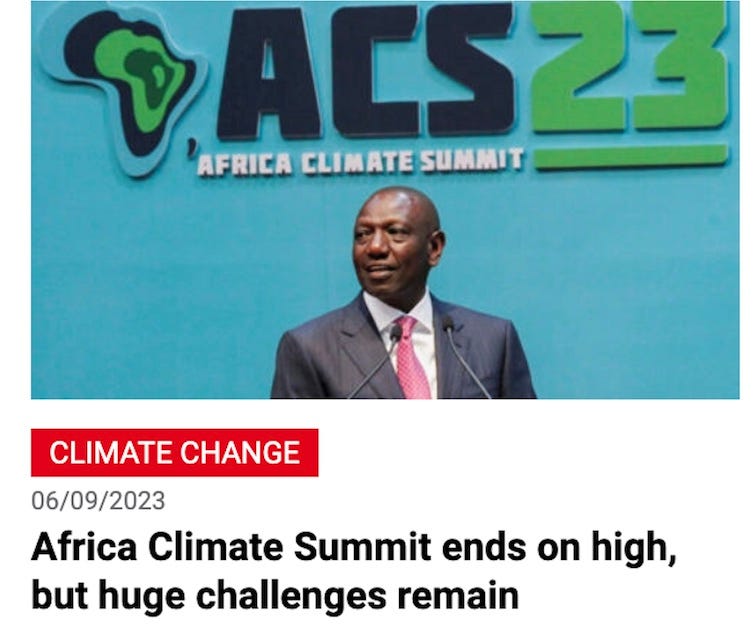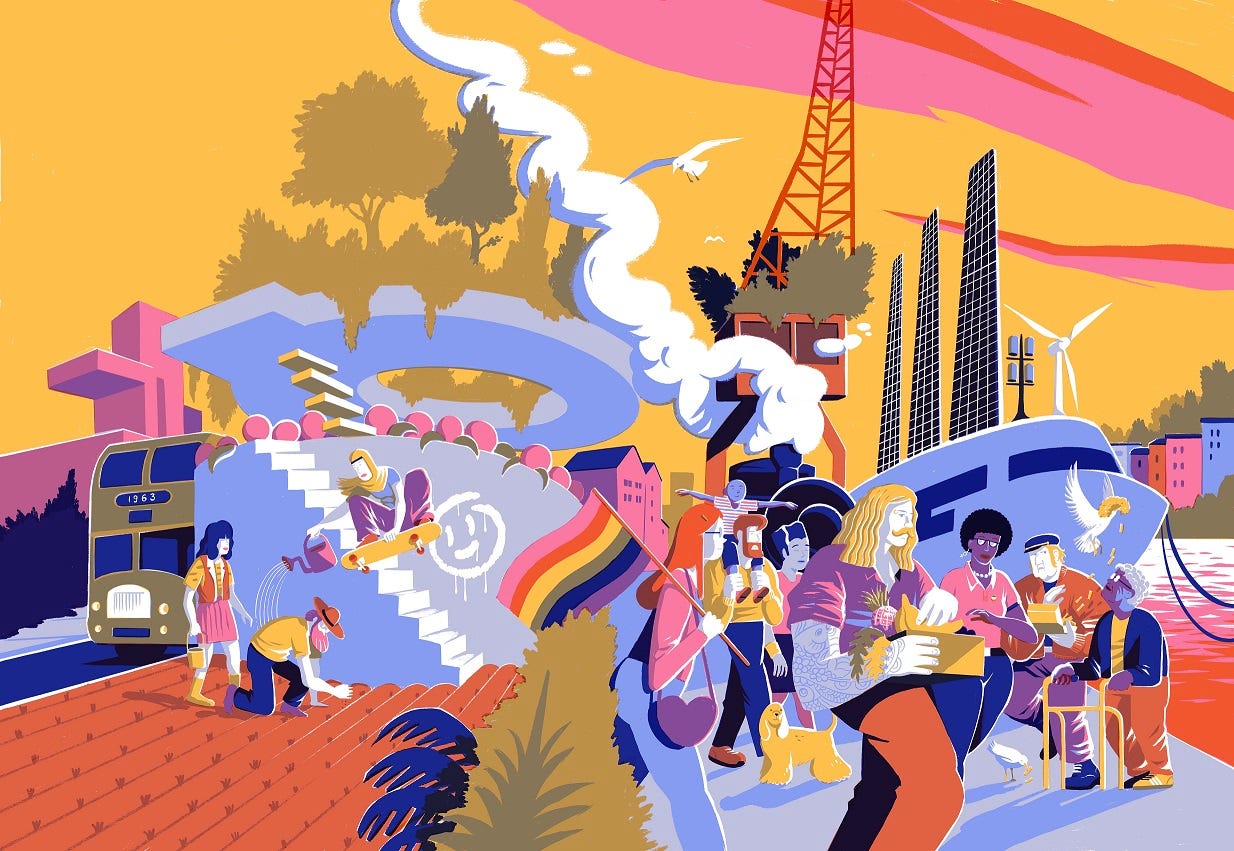Time for Some Climate Solutions
Can we still curve the Climate Crisis? If we don't try, will we ever know?
Dear readers, friends and allies,
Every day, more reports our around the world, from key NGOs and at the United Nations levels ring some alarm.
In the general news, fires, storms, droughts and other disasters are broadcast all over the worlds on a daily basis.
Somalia, Ethiopia, the Amazon forest in Brazil and beyond, Hawaï, Greece, Portugal, Spain, Japan, China, India… and of course Ukraine. All these places and countries have been going through natural disasters or human-made catastrophes more and more in the past few years.
Most of them are linked to global warming, climate change, massive pollution and crimes against our biodiversity.
The next UN climate summit, COP28 starts in November, in the oil-rich United Arab Emirates. We can all contribute to make a difference if we care, share, stay informed, get involved.
To contribute to uplifting the mood, and not only listing problems, we, journalists, need to do better.
As an African news journalist, I have a lot to look at…
I’m only trying, in the midst of lots of political, social and historical work.
First, some of my recent writing in the climate:
Africa Climate Summit ends on high, but huge challenges remain
African leaders demanded sweeping changes to the global financial system and urged the international community to back a surge in renewable energy as they wrapped up a landmark climate summit in Kenya, Wednesday.
Climate activists say African summit failed despite billion-dollar pledges
Africa's first ever climate summit, held this week in Nairobi, may appear to be a huge political success for Kenya and the continent – but environmental campaigners are warning the result is ultimately disappointing. Not enough is being done, they say, to ensure African countries are better positioned to face the climate disasters already on their doorstep.
Ugandans sue TotalEnergies in France, accusing it of human rights violations
Twenty-six Ugandans sued French oil giant TotalEnergies in Paris on Tuesday for reparations over alleged human rights violations at its megaprojects across the country.
https://www.rfi.fr/en/france/20230628-ugandans-sue-totalenergies-in-france-accusing-it-of-human-rights-violations
Fires kill at least 34 in Algeria as fears grow they will spread to Tunisia
Wildfires raging across Algeria have killed more than 34 people in less than 24 hours, and forced mass evacuations, according to the government. The worst hit parts of the country are in the northeast, while there is also concern that the fires may spread to neighbouring Tunisia.
World losing high-stakes fight against alien species
Invasive species that wreck crops, ravage forests, spread disease, and upend ecosystems are spreading across the globe faster than was previously thought.
-
So what can help?
Some solutions!
During the pandemic and especially through lockdown, a friend and I produced a podcast and we tried to focus on good news and solutions, some about how to restore our environments and to better understand how to respond to climate change and disasters.
Here is one interview, still relevant:
A Quarantini with NZ Green Party candidate Celia Wade-Brown
We go to the other side of the planet this week to hear from Green Party candidate and former Mayor of Wellington, New Zealand Celia Wade-Brown. Find out how she feels New Zealand has handled the Covid Crisis and why she thinks The Climate Emergency is more important.
https://the-quarantini.captivate.fm/episode/a-quarantini-with-nz-green-party-candidate-celia
-
What to read:
What are the solutions to climate change? - Greenpeace
Climate change is already an urgent threat to millions of lives – but there are solutions. From changing how we get our energy to limiting deforestation, here are some of the key solutions to climate change.
https://www.greenpeace.org.uk/challenges/climate-change/solutions-climate-change/
The main ways to stop climate change are to pressure government and business to:
Keep fossil fuels in the ground. Fossil fuels include coal, oil and gas – and the more that are extracted and burned, the worse climate change will get. All countries need to move their economies away from fossil fuels as soon as possible.
Invest in renewable energy. Changing our main energy sources to clean and renewable energy is the best way to stop using fossil fuels. These include technologies like solar, wind, wave, tidal and geothermal power.
Switch to sustainable transport. Petrol and diesel vehicles, planes and ships use fossil fuels. Reducing car use, switching to electric vehicles and minimising plane travel will not only help stop climate change, it will reduce air pollution too.
Help us keep our homes cosy. Homes shouldn’t be draughty and cold – it’s a waste of money, and miserable in the winter. The government can help households heat our homes in a green way – such as by insulating walls and roofs and switching away from oil or gas boilers to heat pumps.
Improve farming and encourage vegan diets. One of the best ways for individuals to help stop climate change is by reducing their meat and dairy consumption, or by going fully vegan. Businesses and food retailers can improve farming practices and provide more plant-based products to help people make the shift.
Restore nature to absorb more carbon. The natural world is very good at cleaning up our emissions, but we need to look after it. Planting trees in the right places or giving land back to nature through ‘rewilding’ schemes is a good place to start. This is because photosynthesising plants draw down carbon dioxide as they grow, locking it away in soils.
Protect forests like the Amazon. Forests are crucial in the fight against climate change, and protecting them is an important climate solution. Cutting down forests on an industrial scale destroys giant trees which could be sucking up huge amounts of carbon. Yet companies destroy forests to make way for animal farming, soya or palm oil plantations. Governments can stop them by making better laws.
Protect the oceans. Oceans also absorb large amounts of carbon dioxide from the atmosphere, which helps to keep our climate stable. But many are overfished, used for oil and gas drilling or threatened by deep sea mining. Protecting oceans and the life in them is ultimately a way to protect ourselves from climate change.
Reduce how much people consume. Our transport, fashion, food and other lifestyle choices all have different impacts on the climate. This is often by design – fashion and technology companies, for example, will release far more products than are realistically needed. But while reducing consumption of these products might be hard, it’s most certainly worth it. Reducing overall consumption in more wealthy countries can help put less strain on the planet.
Reduce plastic. Plastic is made from oil, and the process of extracting, refining and turning oil into plastic (or even polyester, for clothing) is surprisingly carbon-intense. It doesn’t break down quickly in nature so a lot of plastic is burned, which contributes to emissions. Demand for plastic is rising so quickly that creating and disposing of plastics will account for 17% of the global carbon budget by 2050 (this is the emissions count we need to stay within according to the Paris agreement).
Climate Solutions - United Nations
COVID-19 exposed the consequences of the failure to make sufficient progress on the Sustainable Development Goals and in implementing the Paris Agreement on climate change. We would have been in a better place if we had.
We must change course, UN Secretary-General Antonio Guterres said, or we risk missing the point where we can avoid the “disastrous consequences for people and all the natural systems that sustain us.”
As we continue to tackle the pandemic, the enormity of the climate emergency can be daunting. What can one person or even one nation do on their own to reverse this challenge?
Good news is that solutions do exist!
https://www.un.org/en/climatechange/climate-solutions
Climate Solutions’ website:
https://www.climatesolutions.org/
Imagine if… green energy brings down big oil (plus, how it could happen)
Positive News
It’s 2050. Big oil is gone and emissions are plummeting. Fantasy or near-future reality? In our ‘Imagining a better future’ series, we report from tomorrow’s world, where everything turned out fine, and talk to the experts for a present-day reality check
https://www.positive.news/environment/imagine-if-green-energy-brings-down-big-oil/
-
Other interesting articles to read:
Climate activists given green light to assemble ‘peacefully’ at COP28
The United Arab Emirates said Tuesday it would allow environmental activists to "assemble peacefully" at this year's UN climate talks, despite a ban on unauthorised protests in the Gulf state.
How MENA's economic and climate crises add fuel to wildfires
https://www.newarab.com/features/how-menas-economic-and-climate-crises-add-fuel-wildfires
Climate change 'dystopian future already here', UN warns
https://www.rfi.fr/en/international/20230911-climate-change-dystopian-future-already-here-un-turk
-
Looking to the Future
Finally, in a month I’ll be at the Festival of the Future City in Bristol, and a lot more solutions will be discussed:
https://www.bristolideas.co.uk/projects/festival-of-the-future-city/
I hope to come back with a few more things to share!
-
As always, thanks for reading and supporting journalism…
With best wishes,
melissa
-
Melissa Chemam
Journalist & Writer
Site: https://sites.google.com/view/melissachemam
Newsletter:






